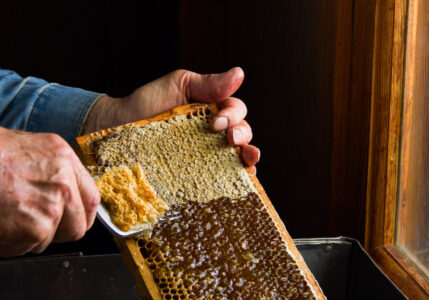Explore economical honey extraction methods for small-scale beekeepers and learn how one apiary uses a unique system to extract honey from frames.
How does a small beekeeping operation get all that sweet honey goodness out of the comb?
There are two basic ways to remove honey from the cells of the honeycomb: the drip (or squeeze) method and spinning it out in a centrifuge extractor.

For a beekeeper with only one Langstroth style hive, the drip method may suffice. Cut off the wax cappings and lay the frame over a container. After a few hours, the honey will have dripped out of the cells. Repeat with the other side. To harvest a top bar hive, cut off the honeycomb, place in several layers of cheesecloth and squeeze. This is slow but economical in terms of tools and machinery. The only investment is a sharp knife and some cheesecloth. This is the cheapest route to honey on your toast.

At Five Feline Farm, the drip method is too slow. We are not a big operation, but have no patience for hours of dripping honey. To process anything over four or six frames, (about half of one super) a mechanical method of extraction is preferred. Beekeeping supply companies sell extractors that will support anything from a small hobby operation to a large commercial enterprise. All well and good but since we were just getting started, we did not want to invest in an expensive extractor. Off to the Internet for a solution.

A Google search turned up an ingenious piece of work I wish I had thought of first. Honey Spinner sells a unique product for about half the cost of the smallest unit at a major beekeeping supply company. This honey spinner is perfect for a small operation. Essentially the unit is made of buckets, PVC, and a few pieces of wood. A cordless drill provides power. The system will spin two frames at a time, although each has to be turned around halfway through spinning to extract the opposite side. The honey drips down the sides into the bottom bucket that is fitted with a nylon filter. The company has improved the design slightly since we purchased by adding a honey gate to the collection reservoir.
Our honey harvesting now goes something like this:
- About 48 hours before extraction, add an inner cover with bee escape under the super to be harvested.
- Pull off the super, ensuring that all bees have exited.
- Uncap the frames using a very sharp knife designed specifically for this purpose. We use a bus tub like is used in restaurants to catch the cappings.
- Spin out the honey two frames at a time, turning each halfway through to extract the opposite side.
- After spinning all frames, add the cappings to the strainer and let all filter through to the collection bucket.
- Allow the honey to settle for 24 hours, then bottle.

We are soon to outgrow the honey spinner, but it is a wonderful piece of equipment to get started with honey extraction.
Please visit our website at Five Feline Farm, or like us on Facebook. You will find the latest news on the farm and an occasional glimpse of the cats.







